Curious realities of the French election
- Published
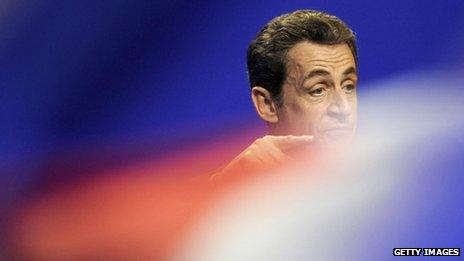
PARIS: In the presidential election campaign going on here, the candidates must tailor their message to a public that wants to protect the "French model" of a welfare state, coupled with a high-profile role in international politics and a strong defence.
Somehow, the public seems to believe these things possible despite a public spending crisis, France's adherence to the new European Union Fiscal Compact (that will supposedly compel deficit reduction), and needing to improve its international competitiveness.
Having attended campaign events in the past few days by incumbent President Nicolas Sarkozy and Jean-Luc Melenchon - the presidential candidate of the Left Front - it is remarkable the degree to which these electoral realities have stood the campaign on its head, at least to somebody whose expectations are conditioned by the "Anglo-Saxon" political template.
At his foreign policy launch, Mr Melenchon, who represents communists and trades unionists, spoke of France's, "singular position", noted it was the world's "second most important maritime power", and employed "the world's second ranking diplomatic network".
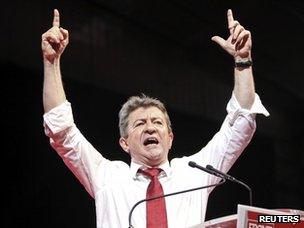
Jean Luc Melenchon campaigns on France's "singular position"
Rejecting the clash of civilisations paradigm of confrontation with militant Islam, he asserted, "France is not a Western country, it is a universalist country".
His presentation was full, in other words, of expressions of French exceptionalism, and of a national destiny based upon its unique culture and revolutionary ideals.
Mr Melenchon has a particular anti-American axe to grind, but leaving that to one side, many of his measures of France's standing - such as the size of its diplomatic network or navy - crop up in the campaign statements of the centre left Socialist Party too.
In this election the left, even the hard left, brandishes the national nuclear force with pride and is also very particular on the point of defending national sovereignty when it comes to EU austerity plans.
The Socialist Party, whose candidate Francois Hollande currently looks like the man most likely to win the contest, has promised to renegotiate the Fiscal Compact formulated by "Merkozy" (ie France and Germany) last December.
As for Mr Sarkozy, who represents the centre right, you might expect he would use an even more nationalistic political language.
His slogan "France Forte" or "Strong France" seems to suggest such an agenda. But when you examine his positions in detail they can appear more moderate, and indeed internationalist, than those of his leading competitors.
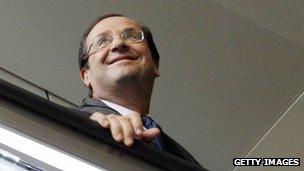
Socialist candidate Francois Hollande is leading the presidential polls
While Mr Sarkozy and those around him say that remaining within the new EU budgetary orthodoxies will not require the sacrifice of the French Model welfare state, they do hint at economic pain.
Some close to the president acknowledge too that they have adopted an essentially German model of budgetary prudence rather than claiming they have a distinctively Gallic solution to the country's woes.
Where has Mr Melenchon's curious marriage of communist and nationalist ideology got him? To fourth place in the polls, behind Sarkozy, Hollande and Marine Le Pen of the National Front as far as first round preferences go.
The Left Front leader's 14% marks an increase of four points just in the past few weeks' campaigning. Some suggest he may even clinch third place, ahead of the two mainstream candidates.
As for Mr Sarkozy, certain polls mark a small improvement in his first round standing, something critics argue has resulted from him taking right-wing positions on immigration, and security issues.
However, when people are asked about how they might vote in the second round run-off that must follow if no candidate gains a majority on the first ballot (on 22 April), most polls show the president is stuck, 8% behind Mr Hollande.
In that second stage of voting, with just two candidates, much of the Left Front vote could easily fall behind the Socialist leader.
These then are the curious realities of this campaign: that the French public is worried that its way of life is under threat and is reluctant to choose austerity.
The left meanwhile, even the hard left, knows that the soothing song of national greatness works far better for them than any British-style hair shirt politics of national sacrifice.
- Published26 March 2012
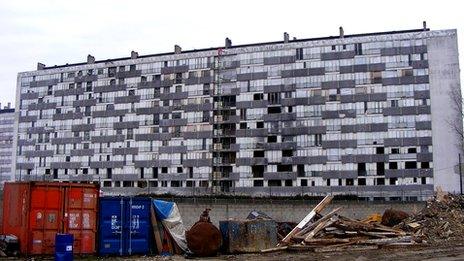
- Published19 March 2012
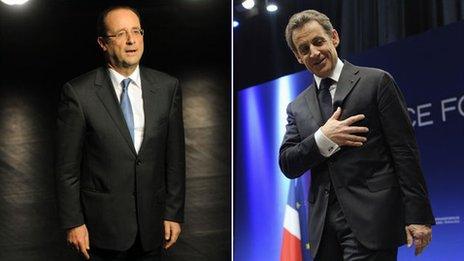
- Published19 March 2012
- Published21 March 2012